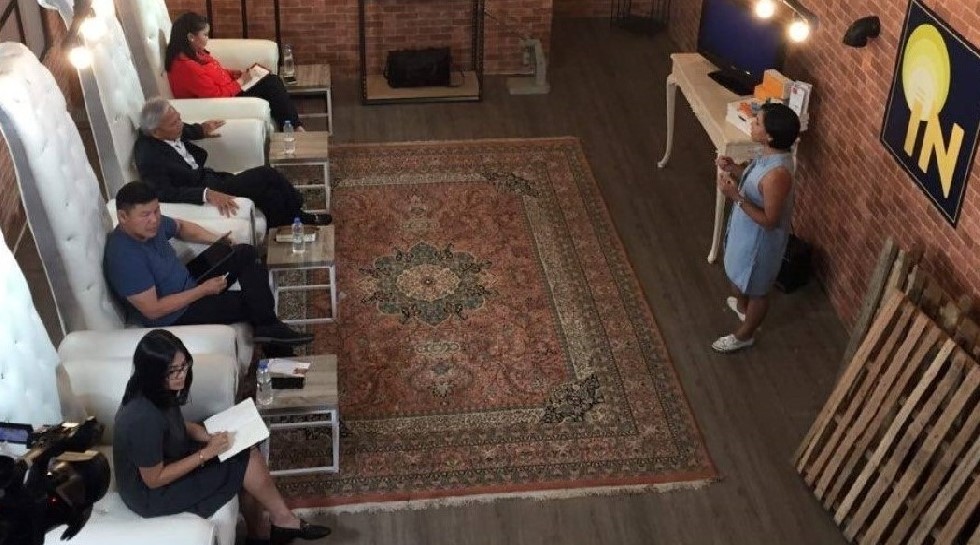Category: Startup
KFit, Guardian, La Juiceria Join BookDoc Activ To Give Rewards For Staying Fit
Combining walking with every Malaysians’ favorite cultural pastime – getting discounts, BookDoc is introducing BookDoc Activ, an excuse much needed to start your exercise plan.
This is a new collaboration where BookDoc will have an ongoing partnership with major retailers and service providers which share the same theme – that is three well-known healthcare brands in Malaysia, namely Guardian, La Juiceria and Kfit to reward BookDoc Activ users for their daily steps.
Users are required to hook the app to a pedometer application and start walking until they reach a daily step threshold. With accumulated points, they can then trade it for the offer they desire. Simply put, the app is an incentive for people to start living a healthier life.
Though BookDoc Activ is promoting the prevention is better than cure approach, the application designed by Dato’ Chevy Beh, a former Managing Director of BP Healthcare Group, BookDoc is originally intended to bridge the gaps in informational asymmetries and reduce inefficiencies in healthcare.
That is to say, BookDoc acts as a platform that can be used to help immediately connect patients in need with healthcare experts who can assist anytime and anywhere – its significance lies in the gift of time that can create a life and death difference.
But that is not all to Dato’ Chevy’s BookDoc as the application also serve another purpose, having partnered with Agoda in July, to help patients with doctor appointments that require traveling. With this feature, it can cater to the needs for booking a doctor’s appointment as well as the accommodation at the same time, through a single app.
Essentially, this function is because BookDoc recognizes that there is a big market of medical tourists. As Chevy puts it, “In this region alone, medical tourism is worth about US$6 billion. Medical tourists amount to about US$250 million in Malaysia, with around 850,000 tourists. In Singapore, there are also about 1 million tourists, generating about USD800 million.”
On a similar note, this region of medical tourism is also taken interest by another Malaysian startup, Smilelink Dental Group who intends to venture into this market of medical tourism as well, focusing on dental healthcare
Though looking back at BookDoc Activ, this new feature is a strategic one as well. As this move not only allows BookDoc to expand their target group since even healthy people now have a reason to download the app but the application through this access to a wider audience can create an awareness of the app among Malaysians.
Additionally, BookDoc has expanded its reach to Singapore, Hong Kong, and Thailand. And although BookDoc offers rewards, acommodation booking, and a healthcare platform, in the simplest terms, BookDoc, as a whole, is an online platform that aims to create a healthier Malaysia, addressing the public’s health problems.
“BookDoc’s objective is not only to provide a seamless platform and access to medical services but is also about taking care of healthy people, as much as we take care of the medically less fortunate, and we believe in rewarding them for staying healthy and active,” said BookDoc founder Datuk Chevy Beh.
The healthcare app is also planning to roll out more discounts with their partner in stages, so users can be on the look out for updated deals.
For more information, please visit https://activ.bookdoc.com/
Philippines To Have Its Own Shark Tank Style Funding Show – I’m In
For those who have enjoyed the seven seasons and 142 episodes under the ABC’s Shark Tanks, there is a new show that showcases entrepreneurs and their pitches as well, but with the backdrop set in the Philippines.
All caught on camera, the new show – I’m In – will feature local aspiring entrepreneur as contestants that will make business presentations to a panel of investors, who will later decide whether they are interested in investing or not.
The show will provide the platform and opportunity for entrepreneurs who have a great idea or solution to real-world problems but otherwise do not have the access to venture capital or a place to showcase their talent.
The format of the show is fairly simple, patterned after the United States Shark Tank. That is the entrepreneurs must introduce the investor panel their product, the amount of money they wish to raise and the valuation they demand. Afterward, it depends on the panel members if they wish to invest.
But beforehand, the contestant’s pitch and proposal is commented and questioned by the panel of investors who may ask tough questions about the business model. At times, the investor may even give a counter offer to the entrepreneur which may be lower than the valuation he or she is asking. But in the worst case scenario, where all of the panel members opt out, the entrepreneur will have to leave empty handed.
Despite that, participants of the show will definitely get a chance to market their idea to the world. That is a chance to become the next Breathometer, which since its Shark Tank experience in season 5, has secured an additional US$6.5 million in funding as well as a partnership with the prestigious Cleveland Clinic. But even if they don’t strike a deal with investors, the guidance and feedback received once adopted has seen most startups having a significant upside in valuations.
Additionally, the startup funding show will be hosted by Winston Damarillo, an enterprise transformation expert who is presently PLDT’s Capital Managing Director, and the Founder and CEO of digital and big data solution firms Amihan Global Strategies (AGSX) and Acalep. Winston Damarillo is also one of the co-chairman of OCEAN (Open Collaboration with East Asia New Champions), a biennial gathering of leaders across sectors in the Philippines.
“Our aim for the show is obviously to get this new breed of entrepreneurs to be funded by angel investors who are here because they have a very strong interest in supporting the next generation of entrepreneurs for the country,” Winston Damarillo, the host of I’m In said.
But as a whole, “I’m In” is created with the goal to create a funding event for indiepreneurs or people who are in businesses focusing on the creative economy such as those related to food, music, arts, fashion or technology like government transparency among others. Besides funding, the show could also help indiepreneurs get support in terms of mentoring
“At the same time, we are going to connect crowdfunding to venture funding.” Damarillo said. He noted the I’m In show is not about finding the next Facebook, Google, Uber, or Airbnb, but the next mass industry in the Philippines. “The goal is to fund hundreds of creative entrepreneurs which we think are severely underserved. They are industries that if we do well can accelerate and even improve the Philippines’ position as one of the fastest growing economies in Asia,” Damarillo said.
This is not the first time that a production house is launching a show based on the Shark Tank concept. India’s The Vault which aired in September is also based off Shark Tank. Furthermore, Shark Tank origins itself is also derived from a live funding TV show created by Sony Pictures in Japan in 2001 called the Money Tigers which was later renamed to Dragon’s Den.
Nonetheless, Philippines – I’m In is being crafted as a dual-screen show, intended to aired on TV and live stream online so viewers can interact and engage. The TV network that will carry the show has yet to be announced.
By Vivian Foo, Unicorn Media
ShopsUp, An Online-To-Offline (O2O) Shopping App Secures US$1 Million In Seed Funding
Following China’s Meituan-DianPing valuation at US$18 billion and KFit’s double acquisition of Groupon’s Malaysia and Indonesia operations. We now move to the O2O sector in India, as Bengaluru-based HyperKonnect Technologies Pvt Ltd has raised a seed funding of Rs 6.6 lakh crore (about US$1 million) for their O2O shopping app platform – ShopsUp.
Two individual investors have participated in this round of seed funding, which are the former president of Huawei Technologies Co. Ltd and present Southeast Asia CEO of Taojinjia, Yang Shu and VR Logistics Ltd’s managing director and promoter, Anand Sankeshwar.
Founded by serial entrepreneur Suhas Gopinath, the app allows shoppers to search online and shop offline from nearby areas. The application also showcases various deals available at neighborhood stores as well as push notifications that are customized according to the users’ search preferences and history.
Despite a boom in e-commerce as seen in Alibaba’s Singles Day Sales or the recent Black Friday sales, India’s retail market which is expected to hit US$1.3 trillion by 2020 has only registered a compound growth rate of 16.7 percent since 2015. Thus, this clearly shows the significance of offline shopping which still retains in the habits of the consumers in the world’s second-biggest smartphone market.
With this, ShopsUp aims to bridge the gap between online and offline shopping by becoming a virtual shopping companion to millennials. With a promise of getting “high on shopping”, ShopsUp targets millennials who still prefer the traditional way of shopping from brick and mortar stores, targeting them with exclusive offers and discounts from their favorite brands and stores.
An additional feature available in the ShopsUp app is that the startup awards loyalty points called ‘shots’ to app users when they shop at partnering stores. This offers instant gratification via rewards that they collect through purchases and even walk-ins in store, collecting loyalty points which can later be redeemed for offers at selected brands outlet.
Some of the rewards that can be redeemed include free movie tickets, cabs rides, spas, or gift vouchers. ShopsUp has also partnered with Uber to provide convenience for buyers with their shopping runs. Besides, other ShopUps’ partnership include Adidas, Pepe Jeans, and Van Heusen, among some.
“Indian millennials want to be rewarded for their window shopping as well as actual shopping behavior, and marketers want to capture these moments as and when they happen,” said Suhas Gopinath, the co-founder and CEO at ShopsUp, “Use of analytics also allows us to partner with top brands and local boutiques and provide them with customized solutions,” he added.
The ShopsUp app is currently available for the Android platform while the iOS version is slated to come soon. Ultimately, the plan for ShopsUp is to use the smartphone to help brand and retail partners with data on a consume’s decision-making habits and choices by telling them where to shop as well as incentivizing the shopper to buy more offline, guiding them to find the right store and desired product while helping shops increase their walk-in rates.
In closing, other startups are also growing in the O2O sector in India. Such as Fashalot, which in April this year, has secured a seed funding round led by YourNest Angel Fund and angel investor Rajul Garg. In the same month, hyperlocal fashion commerce portal Yufta has also raised an undisclosed amount of capital in their pre-Series A. With that, one of the challenges that ShopsUp will face is the competition in this crowded sector, especially India’s largest digital wallet player Paytm, who is also tightening its hold in the O2O commerce space with its acquisition of Near.in last December.
For more information, please visit http://shopsup.com/
By Vivian Foo, Unicorn Media
KFit Acquires Groupon Malaysia To Expand Beyond Fitness Into Local Services
KFit, a year-old service offering gym and healthcare services, has raised more than US$12 million from investors in its Series A funding round has announced today that it has acquired the Groupon Malaysia in an undisclosed deal. The startup is backed by Sequoia Capital India, 500 Startups, Southeast Asia Venturra Capital, SIG and Axiata Digital Innovation Fund.
The news was among expectations as three months earlier the company has acquired the e-commerce group’s Indonesia operations. whereby KFit says the deal is in line with its plan to become a leader in Southeast Asia’s online-to-offline space, short for O2O. Similarly, the company has also launched a deals app called Fave a few months ago whereby the functions of Fave are similar to Groupon.
The reason behind this series of acquisition and the pursuit of the offline-to-online model has been influenced by the signs of potential in China with China’s largest O2O player, Meituan-Dianping, raising US$3.3 billion earlier this year at a valuation of US$18 billion.
“Millions of local businesses are booming in China thanks to the adoption of O2O services, with hundreds of millions of consumers embracing these platforms as part of their day to day lives. The convenience and value benefits of these platforms are key drivers of this new norm. This future is inevitable for Southeast Asia and we hope to be at the forefront of this exciting shift,” KFit CEO and co-founder Joel Neoh said in a statement.
Neoh, the founder of Groupon Malaysia has previously helmed Groupon in Asia Pacific. With this, KFit said Groupon Malaysia will share a fate similar to Groupon Indonesia, whereby it will transition to Fave in early 2017. Essentially, this means that we will see it add new categories for fitness, wellness and other gym-related sectors to its current commerce business. KFit also said that it will retain around 90 percent of staff, with senior Groupon Malaysia executives likely to move on to new roles inside the company.
“This acquisition will see Groupon Malaysia transition to Fave in early 2017 and expand Fave’s offerings to cover restaurants, beauty, wellness, gyms, studios, hotels, holidays, leisure, entertainment, and professional services,” KFit explains.
Founded in April 2015, KFit started out by offering unlimited gym and fitness classes – akin to US-based US$400 million ClassPass – for a fixed monthly fee. It tweaked its model this year, limiting its membership to 10 classes per month, and then branched out into deals for services like massage, spa, beauty and salons as well.
With the present events unfolding, KFit is diverging and setting itself apart from its US predecessor. Instead of becoming a fitness sharing platform in Asia, the company now walks the path of becoming an O2O company as it expands to various other verticals such as food and restaurants, beauty and wellness, and lifestyle and activities. The platforms under the KFit Group – Fave, Groupon Indonesia and KFit – have connected millions of customers to thousands of offline businesses in key Southeast Asian market centers.
“With Groupon Indonesia achieving nearly 2 times growth since our acquisition, we are confident that the same growth principles will bring an exciting new local commerce offering to Malaysia,” said KFit co-founder and CEO Joel Neoh.
Post-acquisition, Groupon Malaysia, an e-commerce marketplace connecting millions of subscribers whereby local merchants will transition into Fave and cover restaurants, beauty, wellness, gyms, studios, hotels, holidays, leisure and entertainment as well.
KFit is a definite startup to note as the Malaysia-based startup within this less than one-year period has raised over US$15 million and is backed by high-profile investors such as Sequoia Capital and 500 Startups, among others.
For more information, please visit KFit at Crunchbase for the company’s timeline activity.
By Vivian Foo, Unicorn Media
Malaysia’s MaGIC, Uber, And Digi Initiate Ideation Lab – ASEAN’s Next Great Idea To Groom Selected Startups
Malaysian Global Innovation and Creativity Centre (MaGIC), ride-hailing app Uber and Telecom operator Digi have initiated an ideation lab whereby 20 startups throughout Southeast Asia will be groomed to be investment-ready and this does not require any equity from the participants. A few selected ones will also proceed to the next round and be given the chance to meet early stage investors.
The program is a six-day initiative known as “ASEAN’s Next Great Idea” which will conclude on November 30. Mentors at the MaGIC include Chelsey Lepage, Innovation Lead at UNICEF, Prashant Pathmanaban, Head of Technology at Google and Michael Octoman, Partner at Navis Capital, among others.
“During the program, the top 20 startups – shortlisted from a pool of 417 applicants – will learn how to develop three key aspects of their future business which are their customer, product, and market,” MaGIC said in an announcement on Tuesday.
Additionally, the lab will also provide participants with direct access to the best resources in the ecosystem: MaGIC’s expertise in building entrepreneurs, Uber’s real world experiences, and Digi Incub8’s strength in startup strategy. All these will help the entrepreneurs to fine-tune their ideas or concepts and create a working prototype, preparing them for the next stage of seed investment and funding.
Following this, the top 10 participants will present their refined business ideas to key executives from MaGIC, Uber, and Digi at the Global Entrepreneurship Community event on December 8 in Kuala Lumpur. Furthermore, qualified ideas will have the opportunity to meet early stage investors and key players within the entrepreneurship ecosystem in San Francisco, as well as a visit to Uber’s Silicon Valley headquarters.
“I hope with programs such as ASEAN’s Next Great Idea lab, more and more individuals are encouraged to come forward with their ideas and develop them further. The emergence of new ideas is what keeps our entrepreneurship ecosystem growing,” said MaGIC CEO Ashran Dato’ Ghazi.
With this, ASEAN’s startup ecosystem will continue to thrive with ideas that can dramatically shape people’s digital lifestyles with their smart devices. While the role MaGIC plays is through instilling an entrepreneurial mindset where solving a problem is at the heart of any startup.
“The ambition now is to help translate the growth potential of these ideas and startups into creating long-term, sustainable businesses,” Digi’s Chief Digital Officer, Praveen Rajan added.
For more information, please visit http://mymagic.my/en/
By Vivian Foo, Unicorn Media





